
Small businesses need to invest in Search Engine Optimization (SEO). According to recent research from BrightLocal, more than 98% of consumers use the internet to find a local business in their area.
Of that 98%, the vast majority start their search on Google. Google is basically the doorway to the web’s content.
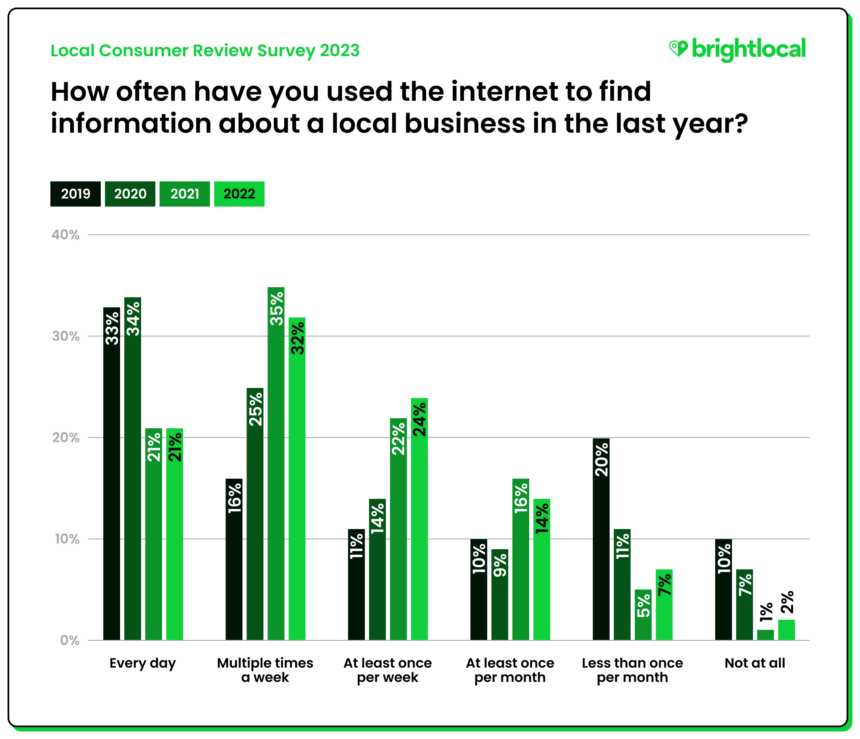
Image source: BrightLocal
When you think about what small business owners care about – leads, sales, conversions – all of these valuable actions start with website traffic.
For many small businesses, their success in generating online leads and sales is dependent on traffic landing on their website from a Google search.
As we know from several industry studies into user behavior on Google, including this one from Sistrix, over half of all Google users click the first 3 results on Google (a combined 55.2% CTR).
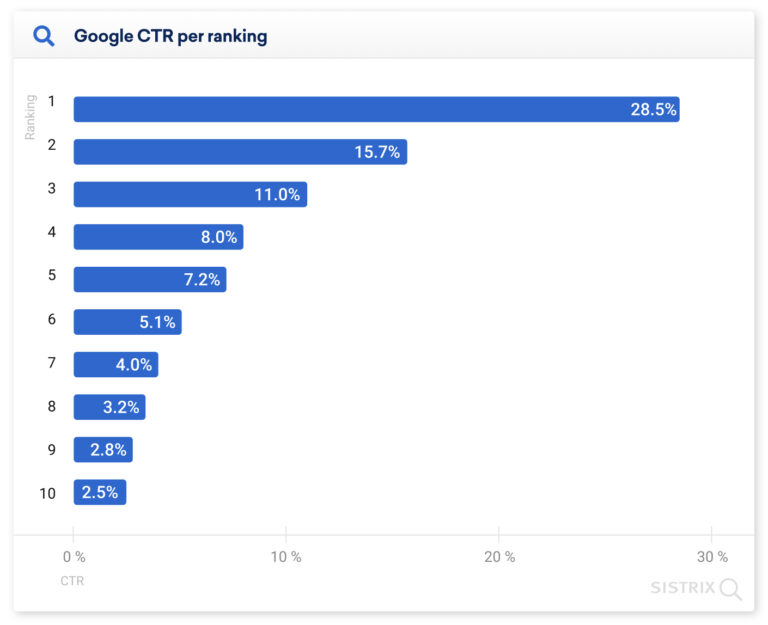
That’s why the position in search results is so important.
The difference between ranking at the top of the 1st page (28.5% CTR) or at the bottom of the 1st page (2.5% CTR) can be a difference of hundreds or even thousands of clicks each month.
Why do Small Businesses Need SEO Software?
If improving your position in search results is your goal, you absolutely need to invest energy, time, and resources into SEO.
The practice of SEO encompasses several aspects including on-page SEO, content production, and link building. SEO Software can help you with all of these.
These tools help automate otherwise time-consuming or complex tasks and output reports, actions, or insights.
Few small businesses rely on just one SEO tool and generally need to curate their own stack of go-to SEO tools to help increase their SEO performance.
What are the Benefits of SEO Software for Small Businesses?
Save Time
This is probably the biggest benefit because your time = money. SEO isn’t easy and it’s most definitely not a short-term game.
Instead, it’s a long-term commitment with ongoing effort needed to continually improve search engine visibility and increased ranking position.
In most small businesses, it’s usually the founder or business owner who is also responsible for leads, sales, or conversions. If this is you, it means you’d also be likely responsible for your organization’s SEO.
There are just simply not enough hours in the day for you to be researching keywords, writing high-quality blog articles, building relationships with bloggers/press, performing link-building outreach, etc.
Save Money
Most of the SEO software we cover in our list can be absolutely replaced with manual work conducted by humans.
It’s just that some tasks, are full-time jobs in and of themselves and require in-demand skill sets due to the complex and ever-evolving nature of SEO.
So weighing up paying a salary of $4,000 per month versus $49 per month on a piece of software is a bit of a no-brainer.
Follow a Process
The great thing with most of the all-in-one SEO software tools is that they provide a workflow process for you to guide you through the steps of setting up, identifying the ‘low hanging fruit’, and optimizing your activity.
Fill a Knowledge Gap
Most small business owners don’t know where to start when it comes to SEO and that’s perfectly normal.
You should be focused on your core business.
SEO tools can help small businesses with SEO issues they don’t even know about.
When starting out, half the challenge is understanding the state of play and what steps you need to take to improve your search rankings.
Increase Performance
The tangible business value of using SEO software is to increase your search rankings which therefore increases your organic traffic and in turn increases your ability to generate more leads, sales, or conversions.
This point delivers on the ROI of your investment in the SEO software you use.
Best SEO Software for Small Businesses
Now that we know the value these tools provide and why you should use SEO software, let’s run through some of the best and most popular options utilized by small business owners around the world.
1. SEOptimer
SEOptimer’s DIY Plan is designed for small businesses. It’s a swiss-army knife of SEO functionality and includes the following:
- Website Audits: run audits on any page of your site to identify and fix any SEO issues that hold your site back from ranking.
- SEO Crawler: crawl every page of your website to find SEO issues in bulk.
- Task & Progress Management: track progress on all your SEO issues and access walkthroughs and guides for how to fix issues.
- Keyword Tracking: track your ranking position against your target keywords over time.
- SEO Toolbox: featuring over 50 individual SEO tools for running specific checks such as a Core Web Vitals and PageSpeed test.
SEOptimer’s DIY plan is reasonably priced for SMEs at just $19 per month and comes with a 14-day free trial to let you dig into the features thoroughly before you commit.
![]()
How to make the most of SEOptimer: Use the Website Audit and SEO Crawler to thoroughly assess your website as it stands today. Use SEOptimer’s guides to fix these issues one by one and watch your search rankings improve with the Keyword Tracking tool.
2. Local Ranking
Local Ranking is a local SEO and GMB management tool for small businesses and digital agencies.
The tool can be used to manage and optimize any Google Business listing. Notable features include:
- Google My Business auditing
- Local rank tracking
- Google review management
- Schedule Google My Business Posts
- See a live “grid” of your local rankings from different locations in your city or town
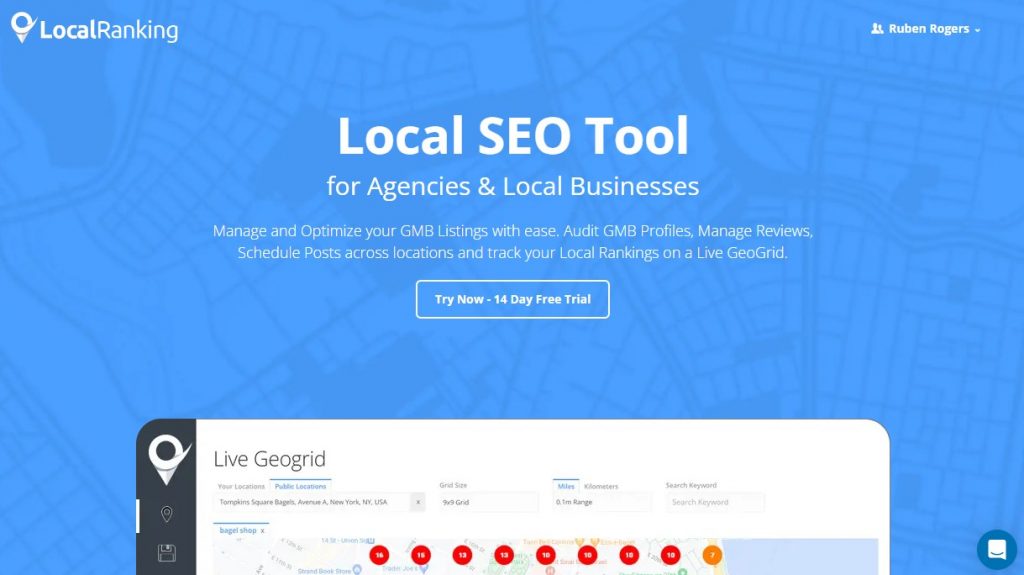
How to make the most of Local Ranking: As a small business owner, you likely have a Google My Business listing for your business. Local Ranking can be used to audit your listing to find any areas that need improvement. You can also use Local Ranking’s Local Rank Tracker to see how your improvements are affecting your local SEO rankings.
3. TubeRanker
TubeRanker is a YouTube SEO and channel auditing tool for creators, digital agencies, and small businesses.
The tool is ideal for any business owner looking to improve their YouTube performance and rankings.
TubeRanker has a plethora of features that users can use to optimize their YouTube channels, these include:
- A channel auditing tool
- YouTube tag extractor and generator
- YouTube keyword research too
- YouTube rank tracker
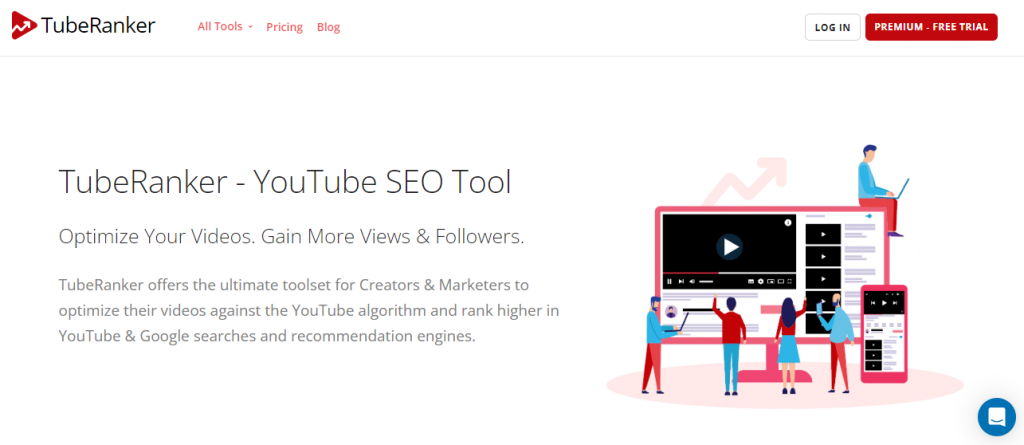
How to make the most of TubeRanker: Small businesses should make a point to create and publish content on YouTube. With that being said, they can use TubeRanker to optimize their YouTube channels and videos. The tool can be used to find content ideas and to find popular video tags based on video topics.
4. Google Search Console
Google Search Console (GSC) is a mandatory tool from Google that all website owners should be using. GSC lets you see the performance of your content on Google including:
- Search Impressions: total number of people who saw your website in search results when searching Google.
- Clicks: actual clicks on your website from search results.
- CTR: the Click Through Rate of impressions vs clicks for each keyword.
- Position in Search: the average position in search results for each keyword you rank for.
GSC also lets you see coverage maps and identify any potential issues whereby the Googlebot hasn’t been able to crawl any of your pages. You can also submit new sitemaps and see your latest Core Web Vitals results.
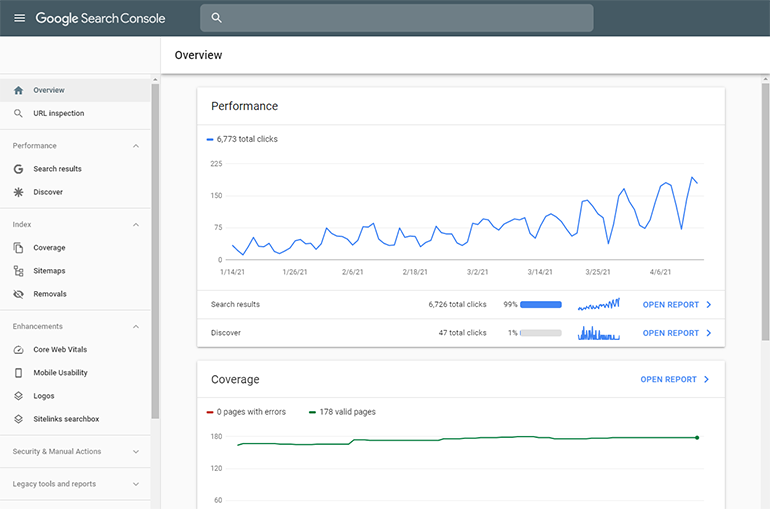
How to make the most of GSC: Apart from keeping your eye on Position, also track the relationship between Impressions and Clicks (CTR) for your target keywords.
5. Yoast
Yoast is one of the most popular SEO Plugins for WordPress and WooCommerce.
Once installed in WordPress, Yoast helps you ensure the content you write adheres to SEO best practices.
It’s free for the majority of use cases but they also provide a Premium version which includes SEO courses, multiple language support, keyword research, and integration with the popular WordPress page builder, Elementor.
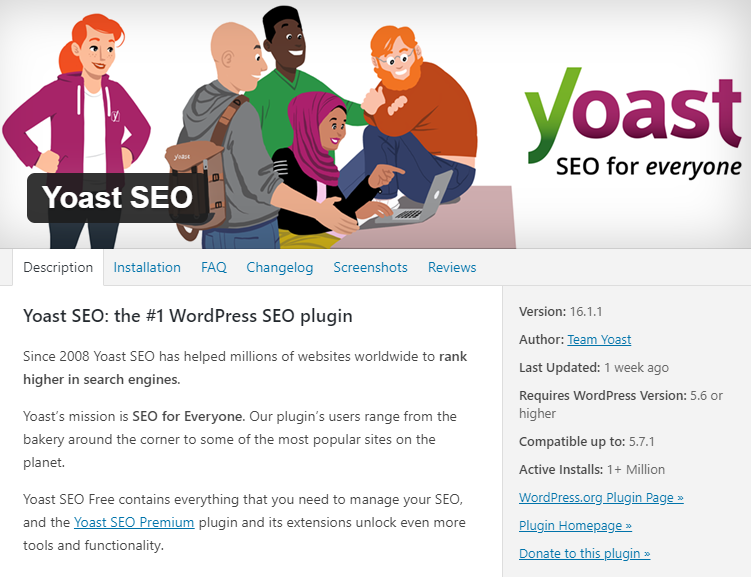
How to make the most of Yoast: Once you’ve installed Yoast and configured all the settings, use the Yoast panel each time you create a new post. It acts as a checklist of sorts to ensure all your bases are covered in terms of keyword usage, metadata, and other SEO best practices.
6. Google Analytics
Google Analytics (GA) is another vital tool for every small business. Not only does GA track the behavior of organic search traffic to your site but it tracks ALL traffic to your site.
GA has fast become the industry-standard website analytics tool with roughly 29 million websites relying on GA to provide their website traffic analytics.
Google Analytics 4 is the latest version of GA and introduces more robust cross-device tracking focusing on the user instead of the session.
GA4 also features predictive analytics and modeling based on machine learning. It also includes new automated insights, new metrics, and improved visualizations.

How to make the most of Google Analytics: Use GA to assess the quality of traffic from each traffic source. As a general statement, you will likely find that traffic from organic search converts at a higher rate than other sources but you should analyze your own results as this can fluctuate by industry.
7. Answer The Public
Answer The Public is a ‘search listening tool for customer and content research’.
The tool uses millions of Google searches to surface insights about how people search when they mention keywords around your business, topic, or target phrase.
The tool explores keyword ideas down 10 question paths. Each path then splits out to the top eight searches by volume.
The tool also provides keyword ideas around comparison terms (like, vs, and, or), related searches, and top adjacent words mentioned around your keyword sorted alphabetically.

How to make the most of Answer The Public: Search for target keyword terms around your brand and competitor brands as well as your industry to gain insight into how potential customers think about your industry. These insights can help how you position your content in a way that answers questions that commonly get asked about your industry.
8. Screaming Frog
Screaming Frog is an SEO Spider software tool used to crawl websites to identify ranking issues.
Unlike all other tools on this list, Screaming Frog does not run in the browser.
Instead, it runs locally on your machine which means you need to download the software first and actually install it on your machine.
Once installed, Screaming Frog lets you analyze all your metadata, generate XML sitemaps, audit all your redirects, discover duplicate content, and more.
It can be a bit technical which makes it a better fit for businesses with more established marketing teams who can dive into the more technical aspects of SEO.
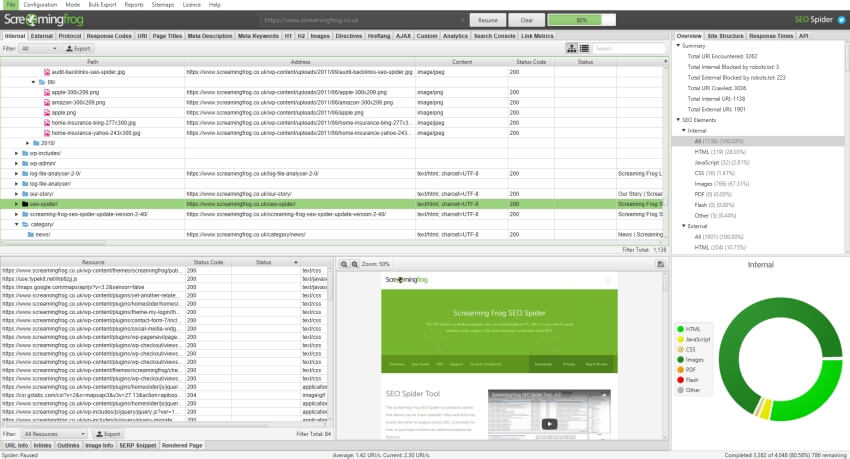
How to make the most of Screaming Frog: Good for larger websites with advanced tracking needs who need to be able to dive into the data itself.
9. Site Speed Bot
We’ve written before about the importance of site speed here at SEOptimer.
As part of Google’s focus on page experience signals this year – your site’s load speed is becoming a major ranking factor. Factors like image size, image type, javascript, template, and server response time all affect the load time of your website.
Using a site speed testing tool like Site Speed Bot can help you benchmark your load speed so you can focus on reducing the load time.
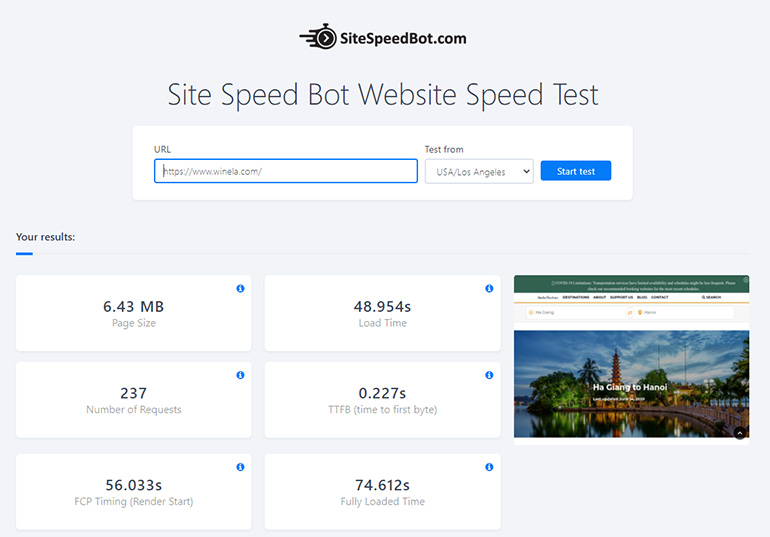
How to make the most of Site Speed Bot: Check your site speed after you make changes to content (especially images) or change the structure of pages. Make sure you are decreasing your load time, not increasing it. Faster-loading sites generally rank higher in search results.
10. SpyFu
SpyFu’s Backlinks tool lists all the websites that link to your site. This is handy for ranking your most valuable backlinks.
The more links from authoritative sources linking to your site, the better.
These links tell Google your site is important and can help increase your position in search results.
The Backlinks tool breaks down your backlinks by domain types and lets you sort by a number of criteria including clicks, domain strength (ie: domain authority), and ranked keywords.
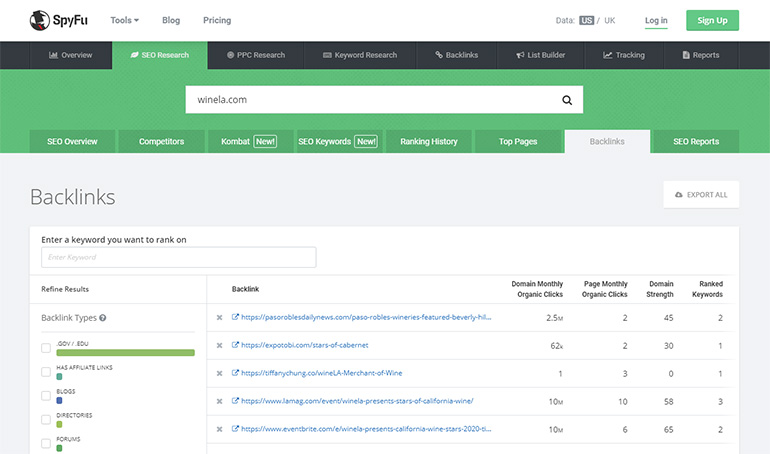
How to make the most of SpyFu: Check your competitors’ backlinks too and try to find opportunities where you can reach out to sites that link to competitors, maybe you can negotiate a new link to your site.
11. QuestionDB
QuestionDB is a useful keyword and question research tool that indexes 3rd party sites like Quora, Reddit, StackExchange, etc.
When you search for your target keyword, QuestionDB displays questions asked around your keyword.
This can help inform content ideas, especially in the early stages of brainstorming.
You might have a target keyword in mind but struggle to structure your article around that keyword. QuestionDB can help fill in the blanks based on crowd-sourced questions about your topic.
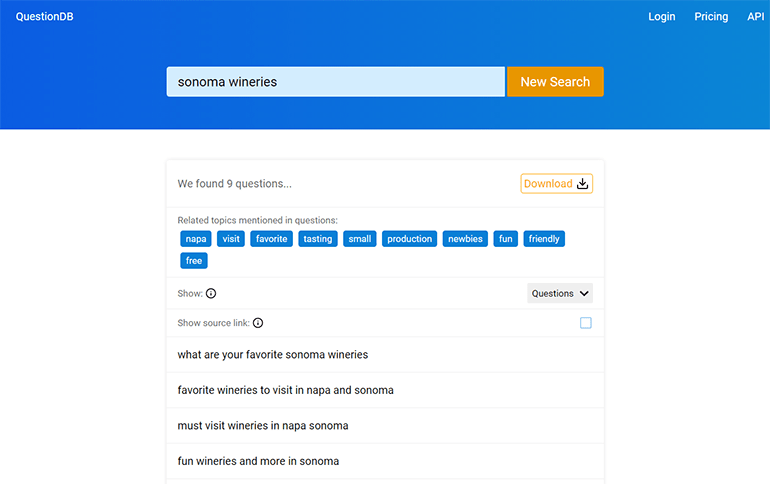
How to make the most of QuestionDB: Before you write an article, run your target keywords through QuestionDB to find interesting angles that you can incorporate into your content.
12. Wordtracker
Wordtracker is a keyword research and market research tool combining Google search data, Google Ads keyword data, and their own proprietary sources.
Mixing paid and organic keyword data can be an interesting way to find new keywords to target.
Wordtracker lets you perform a few free searches with paid plans starting at $27 per month.
![]()
How to make the most of Wordtracker: Find new keyword opportunities around your target keyword and ensure you settle on terms with decent search volume but low competition.
13. Surfer
Surfer is a content planning tool that helps you identify pages and posts you’ve already published that could benefit from some optimization.
Surfer’s Content Planner lets you sort your content by the lowest content score.
You can then put your efforts into refining or otherwise beefing up your lowest-scored content so they can be more competitive on the search results page.

How to make the most of Surfer: Optimizing existing content (instead of starting from scratch with new content) is an effective short-term strategy to drive more value out of the content you already have. Work your way through Surfer’s list and monitor your results over time.
14. Google Trends
Google Trends is Google’s own market research tool.
Leveraging Google’s entire search database, Trends gives you an excellent view of macro-level search behavior in your target countries.
Comparing search terms against each other can be a fascinating exercise and help inform seasonal content or identify increasing/decreasing interest in specific terms.
The example below shows search interest in Merlot is significantly higher than in Syrah – especially over Christmas.

How to make the most of Google Trends: Compare several of your key terms and discover if search interest is increasing or decreasing. Can you find longer-term trends or if there are certain times of the year that spike interest in your keyword terms?
15. Hunter
Link building involves reaching out to site owners and bloggers and pitching them on why they should link to your articles.
The common way to conduct this outreach is via email.
Hunter is a tool that can help you discover the email addresses associated with a website.
Hunter is easy to use, simply enter the company URL and it will reveal known email addresses at that same domain.

How to make the most of Hunter: Identify the key sites and blogs you want to partner with, then run the domains through Hunter to find the most common email pattern for each company (eg: firstname.lastname@site.com or firstinitial.lastname@site.com, etc). Use LinkedIn to find individuals who work at the company and reach out to them using the email pattern that matches their company.
16. INK
INK is a desktop app that helps you author search optimized content on the fly.
It does require you to download and install it rather than working directly in the browser.
The concept behind INK is to optimize your content for search while you’re writing it, instead of doing it after the fact.
The tool uses a scoring system based on existing articles on the web that contain the same keywords and makes suggestions to you while you’re writing to give you a competitive edge.

How to make the most of INK: Use INK as you author articles and identify the patterns in your writing that increase your SEO score. Train yourself to incorporate more of these patterns into your writing so it becomes second nature.
17. Backlink Watch
Backlink Watch is a simple free tool for listing all the backlinks of any website.
Although the interface is a bit old-school, it does the job of discovering all backlinks and also listing the number of outbound links and whether the link has an associated nofollow tag.

How to make the most of Backlink Watch: Identify which pages on your site receive the most backlinks and understand how they are linked. When you perform your link-building outreach, pitch these pages as they are more likely to be successful based on who already links to them.
18. Pitchbox
Pitchbox is an outreach tool ideal if you have lots of high-value content and need to manage how you pitch and perform outreach to bloggers and publishers.
Pitching your content can be time-consuming and laborious so Pitchbox has designed a complete workflow solution for managing and automating much of the process.
You can use Pitchbox to prospect, run actual outreach and manage all your link-building tasks in a CRM-like interface.
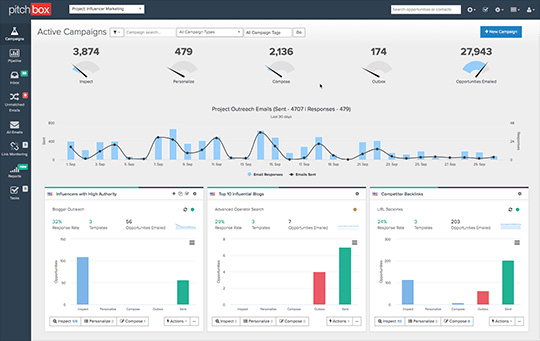
How to make the most of Pitchbox: Once you’ve built up lots of high-value content, use Pitchbox to accelerate your growth by prospecting high value backlinks.
19. HARO
HARO is an acronym that stands for Help A Reporter Out.
The tool connects journalists/bloggers with sources. You can either register as a source or a journalist or both! We use HARO here at SEOptimer to find thought-leader sources that we can include and quote in our articles.
This is great for adding external expertise to your content. You can also use HARO as a source and respond to content ‘call-outs’ from journalists and bloggers.
These call-outs arrive in your inbox as a daily digest and you can simply reply to the ones that fit your content area best. If your submission is accepted by the journalist you can gain potentially valuable backlinks from authoritative sources.

How to make the most of HARO: Register as a source and respond to a few call-outs that fit your industry. Once you land a few backlinks, see if this helps build your domain authority and help increase your search position on your target keywords.
20. Schema Generator
Schema.org Structured Data is a way for search engines to make sense of the content on your page.
Structured Data contains categories that can potentially trigger different search features such as rich cards (often shown on the right side of search results).
To enable Structured Data on your site you need to insert JSON-LD markup in your HTML source code.
The Schema Generator tool is designed to help you generate the necessary category-specific JSON code for your site.

How to make the most of Schema Generator: Explore the different types of markup you can create in the Schema.org documentation. Then use the Schema Generator to generate the structured data relevant to your organization.
21. SEO Content Analysis
SEO Content Analysis is part of the SEO Review Tools suite and works in the browser, enabling you to craft content on the fly while the tool assesses the SEO score of the content against your focus (ie: target keyword).
The tool also provides SEO optimization tips based on your writing and gives you a preview of how the page would look on Google.
Another nice feature is the ability to download your article directly as a Microsoft Word file.
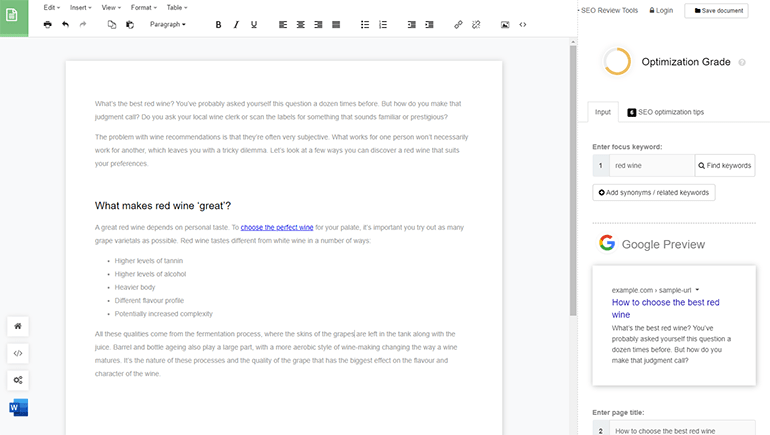
How to make the most of SEO Content Analysis: Start drafting your content in the SEO Content Analysis tool and see how the recommendations change when you change the focus keyword.
22. Copyscape
If you’ve outsourced your content creation to a freelancer or agency, you might want to do a quick check to see if the content is actually original.
Unfortunately, content plagiarism is common and if you publish plagiarized content it can negatively impact your rankings (apart from the obvious issues around IP infringement).
Save yourself the issues by running your copy through a tool like Copyscape which finds any potential duplicate content.

How to make the most of Copyscape: Search some of your existing articles if you didn’t write them to double-check they weren’t copied from elsewhere (or indeed that someone else hasn’t copied you!)
23. Lemlist
If you’re serious about improving your search engine rankings, then you need to really consider link outreach. In fact, backlinks are one of the biggest ranking signals to Google and other search engines.
Lemlist is a cold email and link outreach software that can be used to set up and automate all of your link outreach campaigns.
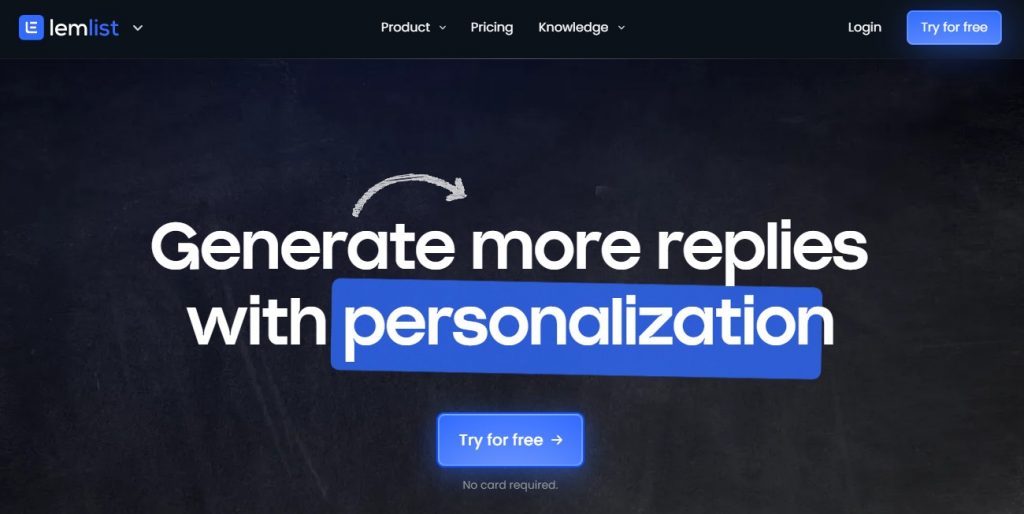
How to make the most of Lemlist: Small business owners and marketers can use Lemlist to personalize and schedule link outreach emails. Simply find the email addresses of the sites you want links from, craft your email, and scale your link-building campaigns.
Common Features of SEO Software that Small Businesses Need
Website Audit
A website audit is a fundamental activity that all site owners should do on a regular basis. A site audit helps you identify issues that hold your site back from ranking higher. These issues might be keyword-related, link-related, metadata-related, or site speed-related.
A site audit should be thorough. Most site audits include over 50 different checks.
The end result of a site audit is a report that illuminates any potential SEO issues and the steps to take to improve each one.
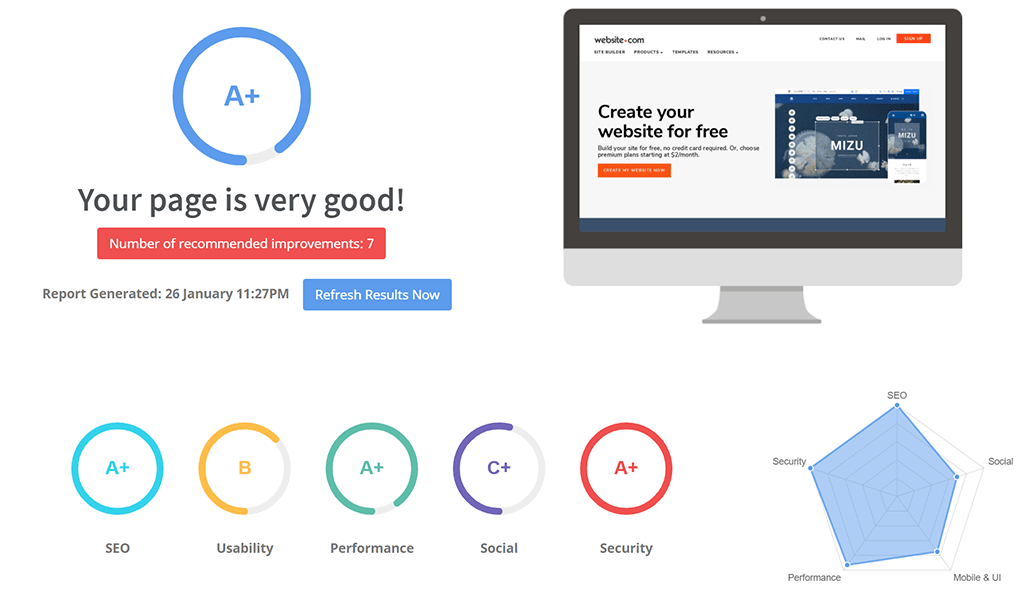
Rank Tracking
Rank tracking helps shine a light on your SEO performance.
This is one of the more time-intensive jobs that SEO software can effectively automate for you at a very low cost.
Rank tracking runs searches on all your keywords in your target regions and shows your ranking position and how it changes over time.
Once you go down the road of SEO, you need to track your ranking performance in order to assess how your efforts are affecting your search position on each target keyword.
Keyword Research
Without keyword research (and keyword research tools) you’re in the dark about what keywords you should target in your content production efforts.
There’s not much point in creating content to target keywords that no one is searching for or conversely target keywords that lots of people are searching for but are highly competitive.
The sweet spot is in the ‘long tail’ of keywords that have decent search volume but low competition.

Identifying the keywords in this so-called long tail is what keyword research tools help you do.
How Should Small Businesses Use SEO Software?
As alluded to previously, most small businesses use multiple SEO tools to help achieve different outcomes that are of most importance to the business.
We recommend trialing as many tools as you can in order to gain an understanding of how they work so you can make an informed decision on whether the investment (in time and/or money) is worth the return.
How to Decide Which SEO Tool is Right for Your Business?
This is a very individual question and only you can answer it!
Make sure you try lots of different tools to find the ones that give you the most value and bang for your buck.
All these tools provide free trials and are either free ongoing or are very reasonably priced for small businesses.
What do you think of our list? Let us know, and tweet us @seoptimer.










